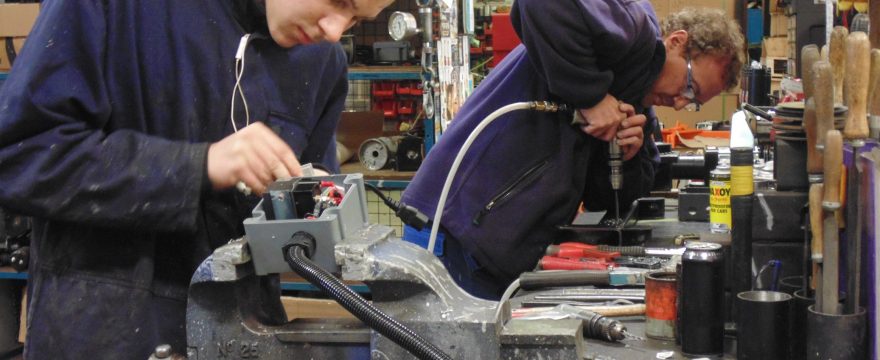Can you provide a quick overview of your business?
Penny Hydraulics is a UK manufacturer of lifting equipment. We have our own purpose-built premises housing a manufacturing and assembly plant, and we’ve grown to become the country’s leading lorry-loader crane, goods lift, and lighting winch manufacturer.
We’ve provided lifting solutions for premises such as Buckingham Palace and a Guinness brewery in Nigeria to large “blue chip” organisations such as BT, Royal Mail, and JD Wetherpoons. We also have the capacity to design and manufacture bespoke solutions to specific handling problems for industries as unique and diverse as nuclear decommissioning, mining, and tyre handling.
When did the business first start recruiting apprentices?
Over 15 years ago. Some of the technical staff who started at the factory on apprenticeships are now managers!
Why did your business consider offering an apprenticeship?
Our factory is built on top of an old coal mine called Southgate Colliery, and the area where we’re based is an ex-mining community. Because of this, we were very lucky to secure a lot of highly skilled technicians when the mines closed, and many still work with us today. Mining engineers are known for their exceptional technical ability and unbeaten problem solving skills, and these members of staff have helped us create the market-leading range of mechanical handling equipment we offer today. However, many of these men are working towards retirement now. Their skills are vital to our continued success, so it’s important that they’re passed on to the next generation. This is where our apprenticeship scheme comes in. To support our community, we also recruit locally wherever possible, with over 90% of our staff living within a 5-mile radius of the factory.
How does the recruitment process work?
We use an external partner to match apprenticeship candidates to us. The company is an apprenticeship specialist, and because we have been working with them for so long, they know the needs of our business inside and out and always pair us with great candidates. The vast majority of our apprentices come from the high school in Clowne, where our factory is based.
What were your first impressions of apprenticeships? And the apprentice you recruited?
The first thing you notice about apprentices is how much they have to learn — not just about the technical side of the work they’ll be doing, but about working life in general. Making the transition from school to working life comes with a steep learning curve, and it can take them some time to learn how to behave in a work environment, speak to their line manager, and get their head around the fact they need to dress smartly and arrive on time. However, it never takes long for them to slot in, and we’re yet to take on an apprentice that isn’t enthusiastic and eager to learn. They usually end up really enjoying the comeradery of our team, and most don’t want to leave.
How do you help your apprentices settle into the business?
Each apprentice is assigned to an in-house mentor who helps get them up to speed. Alongside this, they also have regular meetings with their external training provider to ensure they’re on track with their skill development. Apart from the extra support, apprentices become part of the team from day one. They are treated the same as staff: they eat in the canteen, they have the same breaks, and they work the same hours. In our experience, this is the best way of making apprentices feel part of the team.
Do your apprentices have any specific support – induction process, mentors, additional training, etc, that you feel brings additional benefit to the business and apprentice?
Our apprentices undergo a thorough induction process, just like any other new member of staff. This sets the precedent in terms of how professional we expect them to act, and also contributes to helping them feel like one of the team.
How far have your apprentices progressed in your business to date? How far have previous apprentices progressed?
We’ve had some great success stories. Two former apprentices are now managers on our shop-floor: one manages installation of cranes and the other is focused on bespoke handling equipment for the nuclear industry. Another former apprentice is a welding instructor at our local college.
What challenges, if any, have you found with recruiting apprentices?
The biggest problem we’ve had with apprentices is that they’re sometimes lacking some basic skills when they arrive, even when they are more than capable of the actual job. For example, they haven’t realised the importance of punctuality or dressing the part, and they often need to learn how to communicate with people appropriately in a work environment. That said, it doesn’t usually take long for them to get into the swing of things.
What do you see as being the main benefits to your business?
The skills that are vital to the continued success of our business are passed on to the next generation of staff instead of being lost.
What are your ambitions for the future of apprenticeships and/or the future of your apprentice in your business?
Our aim is to continue to grow our apprenticeship scheme. We’ve just invested in a new £1.5M facility, and we’ll be looking to add five new apprenticeship places on the back of this over the next few years.
